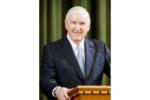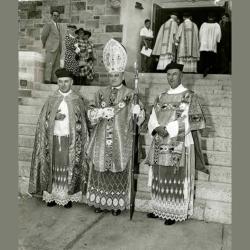Ruminations on the Hall of Fame
As the songster noted, it’s a long, long time from April to October. But for the sentimental baseball fan (and is there any other kind) a lyric moment comes near midpoint when the Hall of Fame opens its doors to a batch of new ‘‘immortals.’’ As usual, however, the process raises more questions than it answers.
This year’s inductees, while worthy, are not overly distinguished in the minds of hard-liners. Not a one of the new lads in this illustrious fraternity needs to apologize in my book. But people do get picky about this stuff, you may have noticed.
Goose Gossage, superior reliever mainly of the Yankees, finally gets his much deserved elevation. Leading to the question: “If Goose, why not Lee Smith or Sparky Lyle or Firpo Marberry?” If it were my call, I’d go with Marberry, the ironman of the Senators and Tigers who perfected the reliever-role back in the 1920s. Lyle, who later raised it to wonderfully eccentric levels, would also get my nod.
The same thinking applies to Billy Southworth and Dick Williams, managers chosen by the newly revamped but no less controversial old-timers’ committee. I like the Southworth pick but contend Jimmy Dykes, even though he never piloted a world champion, would have been a wiser choice. A first-rate third baseman for 22 seasons (1918-1939) who had 2,256 hits, Dykes became arguably the best field-manager of his times. While he mainly managed the White Sox, not the Yankees, scholars of that era (late ‘30s through mid ’50s) insist that in head-to-head baseball combat, Dykes regularly cleaned the clock of such alleged legends as Joe McCarthy. Smart choices like Dykes elude the process, which is too ponderous, and confound the voters who are largely unqualified.
Ranking a close second, in this unfortunate category, is Charlie Grimm, winner of the last two pennants the accursed Chicago Cubs have ever won. That, while a long time ago, is enough to qualify “Jolly Cholly” for Cooperstown and, as a lifetime .290 hitter who had 2,299 hits and was esteemed with the glove, he was Dykes’ equal as a player. Chaps like Dykes and Grimm, who excelled both at playing and managing, should be no-brainers. It’s on that same basis that Joe Torre is a cinch; nor should they wait until he retires. Let him enjoy it.
Thankfully, Dick Williams, who orchestrated the fabled ‘‘Impossible Dream,’’ will get that chance though it was a close call. Dick will be 80 when he mounts the rostrum for the canonization ceremonies on the banks of the Otsego this August and he’s had a hard life. From the standpoint of tactics, judgment and leadership -- the most important managerial criteria -- Williams was the best manager of his era; better than Walter Alston, Sparky Anderson, Tommy Lasorda, or even Earl Weaver who were all breezily anointed much ahead of him. Dick’s hardheaded ways had much to do with his prolonged snub but you should be pleased for him, nonetheless. He got elected while still on the right side of the grass. Others haven’t been so lucky.
And that is oftentimes actually by design, you may be aggravated to hear. One of the electors in this winter’s Veterans Committee proceedings confided as much to me saying that if a candidate is deemed “controversial” (whatever that means) whether or not he’s conveniently dead has much to do with his “electability.” This grisly “X-factor” was almost certainly decisive when said committee chose the controversial Bowie Kuhn, who is dead, over the even more controversial Marvin Miller, who is very much alive. Dead men, after all, tell no tales. Cynical, eh!
It’s a good thing Walter O’Malley is no longer with us. He’s never been forgiven for his treachery in transplanting the beloved Dodgers to La La Land to make a big score. Brooklyn is only a morning’s leisurely drive to Cooperstown. If O’Malley were still around to accept his Hall of Fame honors, the good burghers might have been on hand with brickbats and rotten tomatoes.
I have nothing but contempt for the O’Malley selection, which I find devious. Miller’s opponents argue he was too much about the economics of the game and not enough about the game on the field. But how is that not equally true of O’Malley? If O’Malley belongs, then George Steinbrenner is even worthier. Like him or not, George is a colossus. He has dominated the stage and ... for better or worse... defined the modern game. And if George belongs, put him in now. Let him enjoy it and he would, as few ever have. The business of avoiding “controversy” in these matters is infinitely petty.
But then even the mightiest owners are questionable picks. Somehow, it doesn’t seem appropriate for the Hall of Fame to be elevating millionaire sportsmen and playboys. There can be stray exceptions. Connie Mack, the patriarch who was also a notable player, is a good example. Master showman and racial pathfinder Bill Veeck is another. But in my opinion, Tom Yawkey was an embarrassment given his record on race, the crucial issue of his times. That may explain why Yawkey was picked well after he was dead and gone. Other such choices have been simply inscrutable. Like Charles Comiskey, the tyrannical skinflint who owned the White Sox in 1919 and drove his players to madness. Only Arnold Rothstein was more responsible for the “Black Sox scandal.”
All that aside, there are too many good men who have been overlooked for too long. Were I a king and had the power to do so, there are a couple of dozen chaps I would usher into the lovely old brick Pantheon in a bloody heartbeat. Such a roster would include the aforementioned Miller, Torre, Steinbrenner, Marberry, Dykes and Grimm. And it would extend special consideration to lads who lost huge chunks of big league time because they answered the call to arms in World War II.
The supreme example is Cecil Travis, elegant shortstop of the Senators, who lost four full seasons and never recovered from the severe frostbite he experienced at the Bulge. But there’s also Johnny Sain and Dom DiMaggio who gave three prime years to the Navy. Furthermore, Sain was arguably the greatest pitching coach of all time. Shouldn’t that count for something? You can add Gil Hodges, a decorated veteran, to that list. Give him the three seasons he lost doing hard service-time in the Pacific and he would have been elected 30 years ago.
There should be “special consideration” category for chaps like Minnie Minoso, first of the great Latin players. Minnie surmounted two huge barriers simultaneously and did so with panache. In this category of history-makers, Curt Flood is a natural. Talk of your pathfinders! Roger Maris makes it too. In the steroid era, his achievement grows, wouldn’t you say? Doug Harvey speaks for the umpires. And I would add Tommy John; the first of the bionic arms and winner of 287 games.
Jim Rice should be a lock next year. No one has not come so close and not eventually made it. But what of Jack Morris, Bert Blyleven and Looey Tiant who are just as worthy? Can we agree Ron Santo has waited long enough?
From ancient times there’s Bill Dahlen, McGraw’s favorite shortstop and Wes Ferrell, six times a 20-game winner, and hard-hearted Carl Mays, who won 19 or more seven times. Mays is the best pitcher in baseball history, who is not bronzed in Cooperstown; the price he eternally pays for one errant fastball.
In baseball -- the game with the most structured sociology, deepest culture and longest memories -- there’s no subject more agreeable to debate than this transcendental matter of who should or should not be in the Hall of Fame. The argument never gets old.


















